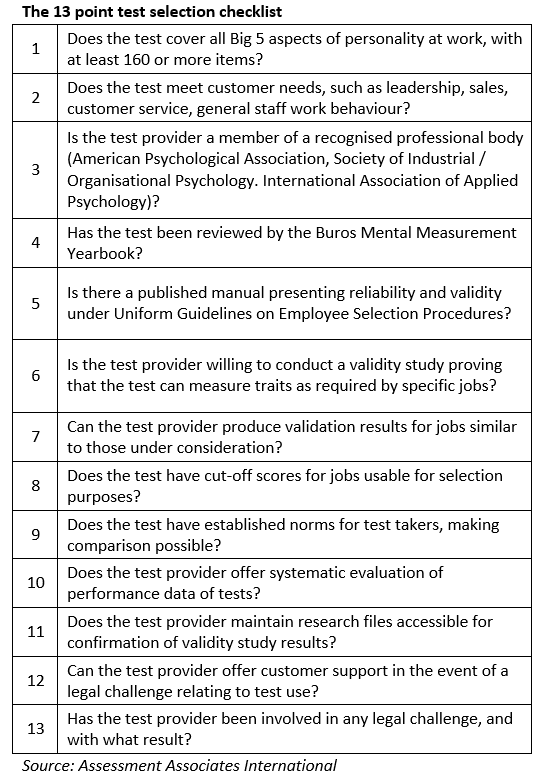Personality testing: an effective safeguard against corporate leadership disasters?
- Published: Aug 2, 2016 11:59
- Writer: Christopher Bruton | 6,640 viewed
The business environment has become much more dynamic and challenging in the last 20 years.
Executive turnover is increasing. Researchers have found that 40 per cent or more of newly promoted business leaders fail in their assignments within 18 months. The overall executive survival rate has steadily declined from over 10 years to less than 6 years. Psychology Today and Harvard found that 82% of executive failures occur because of work relationship failures. They noted that poor personality fit, not years of experience, lack of industry experience or education, were the leading cause of executive failure and turnover.

Powerful leaders tend to become overly self-confident. Subordinates become fearful of providing feedback. Supervisory boards lack inside knowledge and sufficient courage to put on the brakes to halt over-hasty judgements. There are gaps between how leaders see themselves, and how others see them.
Deteriorating results can force even family-owned business leaders to cede power into more capable hands. Because more executives are being brought in from outside the organisation, candidates are increasingly required to undergo psychological assessments.
Most of the Fortune top 100 companies use personality tests for selection of their top executives. Over, 80% of these companies use one particular test, taken by more than 2.5 million people per year. This is the Myers Briggs Type Indicator (MBTI). This test divides people into 16 personality types, along a range of four alternatives: extroverted or introverted; sensing or intuitive; thinking or feeling; judging or perceiving.
Daughter Myers and her mother Briggs devised the test, based on the psychology of Carl Jung back in the 1940's. However Jung himself rejected stereotyping individuals. With billions of people on the planet it is statistically challenging to find 16 separate boxes to put all of us in and make each one of them meaningful and insightful.
The problem with the MBTI is that the testing results are challenged as being unreliable and the categories not accurate, nor meaningful to the world of work. Experiments with repeated MBTI testing have suggested that the same people can achieve different scores on subsequent testing occasions. It is estimated that 60% of people produced a different type after six weeks. The MBTI manual itself says that this test should not be used for personnel selection as it is not reliable enough for prediction of work behaviour.
An appropriate, scientific personality model was developed in the 1990's by Drs. Costas and McRae. This is the Big 5 Model of Personality. They identified five traits: conscientiousness, agreeability, emotional stability, openness to experience, and extroversion. Since the mid-1990's, the scientific psychological community has backed the use of personality assessments used in selection based on the "Big 5" model. Research in the last 20 years has shown the Big 5 is the undisputed gold standard for personality tests because they are predictive by design. There are numerous research studies showing that extraversion, conscientiousness and emotional stability predict executive success. Openness predicts creativeness.
A modern best practice selection process will assess candidates on job related job performance criteria, including competencies, experience and education required to perform. Behavioural interviewing has shown that it improves selection accuracy by up to 25%. The addition of high quality personality and /or cognitive ability assessments can improve that by another 25%. Job appropriate skills tests, work simulations can add an additional 20% and reference checks add another 10% of predictive power to the selection process. A best practices approach employs all of these elements and results in greatly improved selection accuracy and a reduction in first two year employee turnover.
However, using an inappropriate personality assessment can actually hurt the predictive power of the selection process. Tom Payne, an I/O Psychologist, who heads up Assessment Associates International and held senior executive HR leadership roles with two listed companies, supports a modern best-practice selection process including behavioural interviewing. He recommends both personality and cognitive ability assessment be included. He suggests that anyone wanting to include personality assessment into their selection process should be using a "Big 5" based test, with a questionnaire length of at least 160 items to make the separation of personality scales meaningful and statistically significant. He says that using a 70-year-old test is the same as a modern hospital using 70-year-old diagnostic equipment to evaluate a patient.
Payne recommends that organisations that want to make use of the additional predictive power of personality assessment, especially in executive selection, use a 13-point assessment evaluation. This will help any prospective test user to judge the validity of the test proposed to be used (see table). How many of the personality tests available in the market today can pass this "test of tests"?
Christopher F. Bruton, 45 years in Thailand, is Executive Director of Dataconsult Ltd, a local consultancy. He can be reached at chris@dataconsult.co.th. Dataconsult's Thailand Regional Forum provides meetings, seminars and extensive documentation to update business on present and future trends in Thailand and in the Mekong Region.


